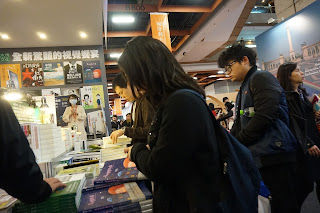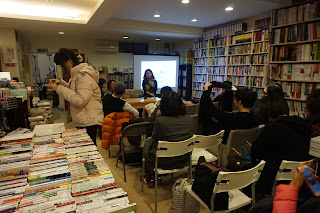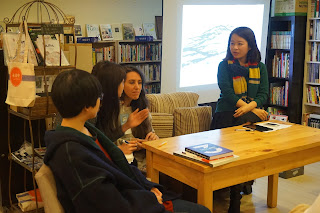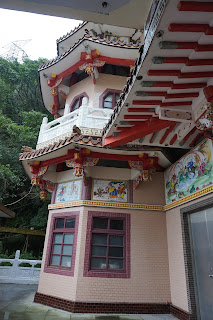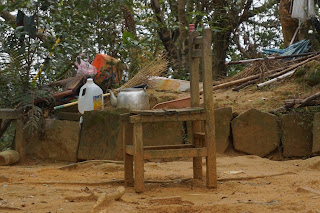Some Things the English made the Cinnamon Press Novel Competition
shortlist;
I couldn't be happier;
sincere thanks to Jan Fortune and
all at Cinnamon Press;
and massive congratulations to overall winner
Jennifer Young!
Monday, October 31, 2016
Sunday, September 11, 2016
Ambit surprised
I am thrilled to bits to have made runner-up in the Ambit 2016 Poetry Competition, many thanks to judge Sarah Howe.
Monday, August 22, 2016
Rialto reality
I've been subscribing to The Rialto for years. I'm chuffed to bits to have work in a poetry magazine I genuinely enjoy and have aspired to be in. Huge thanks to Michael Mackmin, Fiona Moore, Edward Doegar, Degna Stone and The Rialto team for including "Cliff" in issue #86.
Picture credit: Jill Abram, @MalikasKitchen
Monday, June 27, 2016
Tiny tale thanks
It's a great pleasure to have my Tiny Tale "Frank Sargeson's Shed" among such huge talent. My thanks to Michelle Elvy.
Monday, June 20, 2016
Flash two
I'll be reading one of my two competition listed stories at Auckland City Library tomorrow, as part of the National Flash Fiction Day event, 5.30 - 8, Level 2.
Wednesday, June 15, 2016
Oluwale published
The Remembering Oluwale Anthology is now available to buy here and includes my prize-listed piece "Summer in Winter".
Flash review
I'm very grateful to John Lavin for including my National Flash Fiction Day Competition long-listed story "What We Talk About When We Talk About The Treaty" in The Wales Arts Review Flash Fiction Special.
Two flash
Many thanks to National Flash Fiction Day Competition judges James Norcliffe and Elizabeth Smither for long-listing two of my fictions: "What We Talk About When We Talk About The Treaty" and "An Approach to Keeping Cacti". I look forward to reading at the prize-giving on June 22, at Auckland Central Library.
Valley good
My thanks to Miles Salter for including my poem "Immaculate" in this forthcoming Yorkshire Poetry Anthology, to be published by Valley Press with Arts Council England funding.
Tuesday, March 29, 2016
Oluwale
I'm honoured to have my poem "Summer in Winter" selected for the longlist of the Remember Oluwale Writing Prize.
All the longlisted entries will appear in an anthology published by Valley Press.
The Remember Oluwale charity was formed in response to a call for a memorial in Leeds for David Oluwale by Caryl Phillips.
Thursday, March 17, 2016
Page ant
The Masque of Curtis
“I’ve been told I need to open up” reads the narration above
the image of a box doing precisely that over the following four of six panels
on page one of Neal Curtis’ The Talion Maker (Part One). In the final panel,
the box is closed. The simplicity is striking. Page two introduces another metaphorical
image: shards (glass?), which represent being told to “piece it all together”. The
closed, empty box represents our protagonist, and the shards suggest we’re in
for a fragmented narrative, but the effect is more like poetry than post-modernism.
Over the course of Part One, the shards motif is repeated,
urging us to remember that opening request to piece it all together, to work like the ants depicted infiltrating a crack in the wall on page 12, a device
which works particularly well where panels don’t follow on sequentially. Then
another image is introduced, a porthole in a cell door, its circularity echoed
by a smiley face, loo roll, toilet bowl, moon, sun; the images build like “sediment”
into a musicality in the same way sonic echoes develop in poetry. And although
the title tells us this is a revenge tragedy, there’s a reference to Shelley’s
Ozymandias on page five that hints at Romantic quest with a capital R.
As Ozymandias begins in ruins, so does our narrator and his
narrative, but we are guided to piece together the fragments in what is
redolent of another Shelley poem, The Masque of Anarchy. That poem arose from
the Peterloo Massacre, as one of the first documented examples of peaceful
protest, though peaceful protest seems unlikely for our narrator when he reveals
a gun.
Just as the allusions to poetry stack up, so do the
references to conflicts: Che Guevara, Hitler, the Berlin Wall, 10 Downing
Street, prisoners wearing jumpsuits and hood with their hands bound in the
style of Isis captives, The Crucible (McCarthyism), Pop Idol. Yes, that’s
right, Pop Idol. Because this isn’t just a story about large scale global issues,
predominantly the refugee crisis, this is primarily a parable of British
culture with a distinctly Brit-pop feel. It’s probably not accidental that the
protagonist keeps his weapon in an Adidas shoe box. The latter detail and the
panel lamenting “the last independent” bookshop tipping into bathos, but the
contrasting levels, the small scale issues like bookshop closures intersected
with globally recognised cultural threats, keeps the overall narrative’s feet
on the ground and stops it becoming too far-fetched.
With Isis in mind, a reader interested in Shelley might now
think of his poem “The Revolt of Islam” (1818). The epigraph on the first
edition reads: “Hope is strong; Justice and Truth their winged child have found”.
That poem followed the story of Laon and Cythna as they initiate a revolution
against a despotic ruler. The reference may be a stretch, but thematically it’s
a good fit. Both works are symbolic parables for revolutionary idealism.
The Talion Maker is at the time of this review incomplete,
so it’s not possible to come to any meaningful conclusion, though Part Two continues in a similar format. Considering the
opening, I would hope to see the protagonist breaking out of those restrictive
square panels, and for the various backstory pieces to be brought together in a
manner that makes their purpose definitive so that the events alluded to in
Curtis’ work are brought cohesion in a work that looks set to do what hasn’t
been done for Peterloo, and stand as a tangible memorial to what Britain has
lost during times of poor leadership.
Wednesday, March 9, 2016
Room to exercise
Introduction to Screenwriting: 2.6
An exercise to develop character outlines
For this exercise, I've stuck with the example of Emma Donoghue's Room that I've used in the previous units. I probably missed some important major actions, but I didn't over think the process. I was surprised how helpful the list was to outline Jack's character.- Jack revisits Room and says goodbye
Jack plays soccer with a friend
Jack leaves the upstairs landing to play with a dog
plays with the toys strangers have sent him
timid in hospital when breakfast is brought in on a tray
shouts help
runs away from Old Nick
practices rolling up in rug
pulls apart the toy car Old Nick brought for his birthday
heating goes off
eats birthday cake
physical exercise
Jack makes himself breakfast
from inside Wardrobe, Jack looks through a crack to see Old Nick
From the off, Jack's view is one of inside, looking out. He has a literal understanding, expressed by his personification of nouns: spoon, for eg, is called Meltedy Spoon, as though a proper noun; Room is a character, etc.
Jack doesn't understand the concept of being able to go outside. He is curious and intelligent but also timid.
A casual observer might describe Jack as feminine and timid.
Because of his mother's depression, Jack has learnt to be independent, making his own breakfast, occupying himself for en entire day and finally putting himself to bed during one of her episodes.
Monday, March 7, 2016
Memo random
I recently reviewed Vanessa Gebbie's Memorandum, poems for the fallen, published by Cultured Llama. I thought it would be memorable to write the review on memos and post to Twitter under the hashtag #Memorandum. I was thrilled to see Cultured Llama have gone to the trouble to write a lovely thank you for my efforts, including "This has to be the most unusual and beautiful review format of any of our books." and this. But just in case you have trouble reading my handwriting, here's a transcript:
Memorandum
poems for the fallen
Vanesa Gebbie
Reviewed
by
Rachel J Fenton
Memorandum (memo)
from the Latin memorandum
est, "to mention, call to mind,
recount, relate,"
"it must be remembered (that)
a document that helps the memory by recording events or
observations on a topic, such
as may be used in a
business office
The title evokes
Tennyson's requiem
for his friend
Hallam, "In Memoriam".
Like Tennyson's poem,
Memorandum is a
meditation on grief,
mortality and nature
in light of the
man-made.
Cenotaph, the first
poem in the collection,
pays respects to its
literary heritage as it
sets down its themes.
"Under duress, " the poem
begins the process of
dissolving the elements of a
monument as though
describing the erosion of
crustaceans on the sea bed.
But these are "Veteran shells"
and the reader is presented with an
understated question about
the nature of war.
With Gebbie's guidance, the
reader undertakes an
imaginative journey into
the fabric of the memorial
itself. So subtle is the
transaction that the
realisation it has taken
place is as startling as
discovering the sea bed is
man-made.
There's irony with this act
of disarmament. It's only
with "Transfiguration" the
reader becomes certain
they are where their
guide intended:
"accompaniment to
serious alchemy".
Then it's "us" in "The
Soldier's ragged choir,
St Pancras New Church",
and here Gebbie's short
story apprenticeship becomes
evident in the colloquial
narrative via which she
demonstrated her aptitude
for ventriloquism.
From St Pancras to
Euston Station, these
poems are crafted like
inter-linked short stories
and could feel contrived
were it not for the
obvious emotional investment
the author has with her
subject matter, and the very
real people who inhabit it.
Gebbie's sincerity is
palpable in the care
with which she details
the employees of
Waterloo Station, Smithfield
Market's meat porter, and
"The Quarryman and the
Fusilier" - ordinary people
paid heroes' respect.
It's in the second section
of the collection where
Gebbie's mimicry comes
into its own. There's
no longer the feeling
of participation here
but witness.
"Suppose / Alf Norman
wasn't really here?"
(Alf Norman
Grangetown Memorial, Cardiff
p19)
But he was. And the
reader is and must be.
This is necessary
remembering.
Of the sixteen poems in "Other
Memorials" "Remembrance,
Sunday" stands out with
devastating singularity. Perhaps
it's an effect of "something
I wrote in blue biro", the
unpretentiousness of the fact -
for this is fact as opposed to
feigned inhabitation. Gebbie is
not imagining, she is
remembering her father, all
the more poignant as his own
long goodbye is revealed,
eleven poems in.
The final section of the
collection takes the reader
through "Western Front
Battlefields" and is more
in keeping with the war
poetry many readers may
be familiar with: Ivor
Gurney and Siegfried
Sassoon spring to mind.
A number of these poems
were previously published
in The Half-Life of Fathers
(Pighog Press) and are
familiar to this reviewer,
though it is a testament
to the richness of Gebbie's
writing that their placement
here channels new
readings.
It is in this final section
that the theme of cost
that has been steadily
building really begins to
weigh on the reader.
The book's central segment
now seems like a fulcrum.
Money is in one pan, in
the other the reader must
balance the cost.
There's a last echo to
"In Memoriam" in
"La Boisselle pastorale,
diversionary tactic,"
written in memorial of
Gebbie's "second father".
"A few short weeks and
Christmas will be here.
I'll miss my father's face at table
again."
Again and again, Gebbie
catches the reader off
guard with the intimacy
and familiarity of these
memorials. The headstones
may be worn but the
names, in Gebbie's hands,
walk among us long
after the book has been
laid to rest.
Like "In Memoriam",
these observations
are not presented in
the order they were
written, but it is
hoped they offer
the reader comprehensive
insight.
Tennyson emerges
from "In Memoriam" with
his faith in God
reaffirmed.
What does
Memorandum leave the
reader with?
After so many wars,
its a challenge for a
poet to say something
new about this too
often tried subject. It is
credit to Gebbie that
she not only manages to
bring war's aftermath
into fresh relief but that
she does so with such
sharp focus as to make
the reader reconsider the
fallen as if knocked-off-
their-feet with them.
This is a meditation
for those of us left
behind. For whom do
we grieve the most?
These are poems
for the fallen
but not forgotten.
They will be remembered.
Cultured Llama Publishing
2016
ISBN 978-0-9932119-4-2
In her own (three) words
Massive thanks to Ellen Falconer for interviewing Indira Neville and me about Three Words for The Wireless: In her own (three) words.
You can read all about Three Words and see photographs of the Auckland launch here.
You can read all about Three Words and see photographs of the Auckland launch here.
Wednesday, February 24, 2016
Island to Island
Five Days in Taipei
 I am grateful to the Publishers Association of New Zealand (PANZ) and
Creative New Zealand (CNZ) for making it possible for me to return to
Taipei to promote Island to Island (Dala Publishing) at the Taipei
International Book Exhibition (TIBE).
I am grateful to the Publishers Association of New Zealand (PANZ) and
Creative New Zealand (CNZ) for making it possible for me to return to
Taipei to promote Island to Island (Dala Publishing) at the Taipei
International Book Exhibition (TIBE).
The book is the result of a collaboration between three artists from New Zealand and three from Taiwan: Ant Sang, Tim Gibson, Rachel Fenton (me), 61Chi, Ahn Zhe, and Sean Chuang, that began with the New Zealand Book Council's Graphic Novelists exchange Residency, in association with PANZ and TIBE, back in October 2014.
As then, I kept a visual diary of each day, as well as a photo journal. My Five Days in Taipei begins at Auckland International Airport:
Day One
Day Two

 Intriguing messages appear on stands around the book fair.
Intriguing messages appear on stands around the book fair.Upstairs, I am given my first copy of Island to Island in preparation for the workshop I'm about to take part in. I read as the room fills before me with graphic artists, cartoonists, art historians, university professors and students from all over Taiwan.
Sean Chuang's "gift" to me has me in tears.
I'm not always comfortable having my photograph taken with fans.
But Aho is always nearby to make sure I honour my duties!
Day Three
Before catching a taxi to my next event, I wait for Aho, my publisher, at the Locus book stand and photograph people reading Island to Island.
A quick cab ride across the city has me and Aho in the part of town where he lives. The streets are narrow and the shops varied and of interest to the students who live here to be close to the university.
Just before the event, Aho takes me for something to eat before we meet Yang Chia-Hsien, an acclaimed Taiwanese poet who is going to discuss graphic poetry with me and 61Chi.
I've read several of her works in translation - we exchanged poems - and I feel very honoured to have her praise of my poetry.
We talk about some of the differences between Chinese traditional poetry and Western poetry, and note some similarities between formal poetry and graphic poetry. Island to Island is an unusual collection because of its poetic nature.
61Chi's "gift" to me, for example, has no words. It is left to the reader to interpret the interplay between the non-sequential pictures and work out what they might mean.
As an example of my own graphic poetry, I have taken along posted sized pages of "Alchemy Hour".
I make a new friend - Kevin is also a poet.



Then I take a taxi back to my hotel.

A van transports a box printed with the word "HEART".

The taxi passes The Grand Hyatt, the hotel where the NZ Guest of Honour delegation stayed last February.
I promised Tina Makereti I'd Tweet a photograph for nostalgia purposes.
In the seating area, a young man has his head in his hands,
elbows on knees. He appears to be crying.
I don't press send.
Day Four
I get up early, eat an extra large breakfast
and head across town to deal with some unfinished business.



 The city is pretty deserted at this time.
The city is pretty deserted at this time.It's only as I approach the mountains that I start to see signs of life.
Hikers pause to appreciate one of the many temples on the route.
I watch a dog practicing yoga - early morning is the best time, for ying and yang - but I'm distracted by a man shouting "Foreigner". His name's Geoff and he wants to give me a tour of the temple.
He tells me about the goddess, urges me to take pictures because, "You're a foreigner, you're ok."
Stray dogs gather in front of the goddess.
I ask Geoff the way to the mountain. He tells me to take the left every time the road forks.
A dog wearing a coat runs to greet me.
I hop behind a couple, ask if they mind me walking with them. They laugh, tell me they have a child who lives in Canada. They say their English is very bad. I say it's better than my Mandarin. I'm very funny, apparently.
I leave them when the road forks. Now the mountain talks to me.
All the way up the mountain I hear dogs, their barks and howls mingled with the sound of singing from the temples.
Another temple. Each time I see one I pass a message to Buddha.
I make it to the summit where there are "People, people, people".
I'm so happy, I run part of the way down.
I meet 61Chi at the Metro station outside the Taipei 101 building and she takes me over town to have afternoon tea with Lawran, our translator from last year. In lieu of rose milk tea, I celebrate with hot chocolate and lemon pound cake.
Day Five
My final event is a group interview in Theme Square.
劉宜其
林嘉萱
關婷勻
張敏慧
After the event, we go for a last meal together: spicy hotpot.
Then 61Chi takes me to see her neighbourhood.
My flight leaves at one pm. I eat breakfast and go for one last walk.
I take a happy photo outside the Grand Hyatt. People are eating breakfast in the ground floor restaurant where I once watched a poet asking for an apple. They don't see me.
Subscribe to:
Comments (Atom)
























